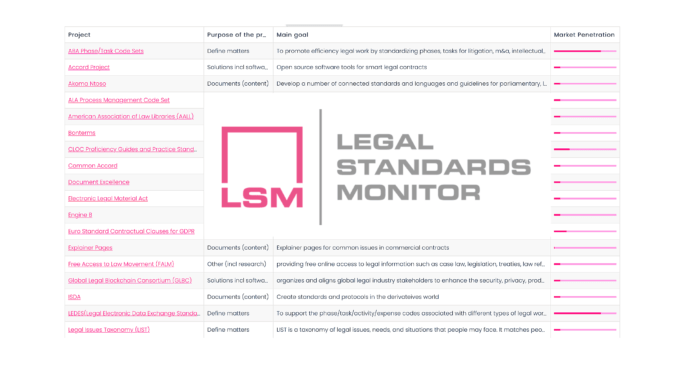
It’s with pride that Artificial Lawyer can announce the launch of Legal Standards Monitor, which aims to promote the adoption of standards across the legal industry. The project grew out of the Changing Legal Think Tank, which this site’s founder, Richard Tromans, created.
Changing Legal started during the pandemic as an effort to gather minds from across the legal ecosystem to help develop ideas that would drive systemic change in the legal world. The founders of the Legal Standards Monitor, Helena Hallgarn of Virtual Intelligence VQ, and Mark Medice of LawVision, are also board members of the think tank and as you will see below, our regular Zoom meetings and discussions soon led us to the need for greater awareness of the many standardisation projects taking place around the world. It also became clear that this was something that was going to need its own dedicated focus. And so, Legal Standards Monitor was born.
To explain some more, Artificial Lawyer spoke to Sweden-based Hallgarn (pictured below) about the project.

– How did this get started?
The idea came from discussions within industry think tank Changing Legal, an initiative supporting positive systemic change in the legal sector.
We decided to survey the market to understand the many legal industry standards today since one of the aims of Changing Legal is industry modernisation and better pricing approaches. We didn’t know whether to expect 30 or 300 responses!
After conducting the survey, we created a living catalogue rather than simply producing a report, as that seemed like it could add greater value.
The idea is to create an ongoing living environment for standards collaboration and the wider community.
Legal standards present new challenges of their own. For example, there are many standards groups; some have been around longer and are more established. Other standards are modern, but not well utilized. The idea is to close the gap between industry modernisation, standards groups, and enablement.
Legal Standards Monitor tags standards groups by purpose and focus, allowing users to refine their search, discover relevant standards bodies, and understand their place. Importantly, it will draw on the legal community for updates, discussion, and personal connections.
We presently have several partners and will hopefully be able to share the management of this monitor with several other enthusiasts. Our initial sponsors are our home organizations: Virtual Intelligence VQ, to support us in building and hosting the monitor, and LawVision by helping to shape our thinking and championing the production of our events.
– Why are standards so important for the legal world?
Standards create a common language. They generate efficiency and ultimately accelerate positive change. Despite the great success of legal organisations globally, standardisation has tremendous upside.
Standards have been crucial to advancing industries such as medicine and banking. So there is much we can learn from their success, which will validate our theories for standards advancement in law.
– Why is it (it would seem) so hard for the legal market to adopt standards?
As long as we are stuck with the mindset that every matter is bespoke, using the billable hour will be the primary way to measure legal work. Presently, about 80% of matters for large law firms are performed using the billable hour, which has changed only slightly over the past decade. Note that there is nothing inherently wrong with the billable hour, but there are better ways to value legal services and share risk. Hourly billing has also been a very profitable way of running a law firm while also operating as a key measure of success for lawyers. Thus inertia sets in, and progress is slow.
There are also many standards groups operating in the marketplace, which can create confusion and, in some cases, competition among the standards bodies. Also, the legal industry comprises many perfectionists, so they are hesitant to try out a standard because they perceive it as imperfect. And the waiting game goes on.
Structurally, standards face resistance because they require critical mass adoption by key industry stakeholders, including law firms, clients, technology providers, and other industry participants.
– What is your long-term hope for this project?
Initially, we hope to provide greater transparency to standards so that organisations are more willing to learn about them and find opportunities to try them out.
In time, we hope to build a community of standard providers and users to reduce friction and accelerate standards adoption.
If successful, we will create more standard processes, pricing models, metrics, and greater service automation. That way, we can help accelerate a more modern legal sector with standardized contracts, automated tasks, and new delivery models for legal services.
Thanks Helena. It’s great to see this project coming out of Changing Legal. Looking forward to seeing how it evolves!